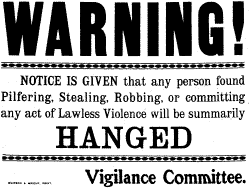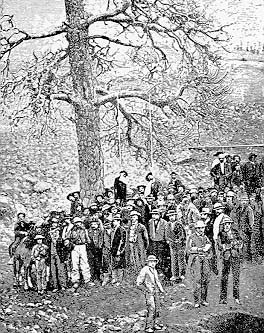by Terry McGahey
Last but not least, we have Hillary Clinton. This woman is also a Socialist underneath of it all, just not outwardly. She has been proven to be a liar time and time again as well as a cheat and a thief. She cheated in the stock market with insider trading, then she and Bill stole items from the White House and were forced to return them.
Associate Writer/Historian
The majority of politicians on the left and right side of the political spectrum cannot seem to grasp why Donald Trump is surging ahead in the polls, not only within individual states but also doing very well in the national polls.
The majority of politicians on the left and right side of the political spectrum cannot seem to grasp why Donald Trump is surging ahead in the polls, not only within individual states but also doing very well in the national polls.
Of course the Democrats in power want nothing to do with Trump because of their Socialist leaning policies, and the Republicans want nothing to do with him because he is not part of the good old boy system and realize they cannot control him or expect him to toe the party line which amounts to politics as usual and mediocrity.
The American people are sick and tired of politics as usual because neither the left nor the right has done anything in the past many years to bring decent paying jobs back into our country, nor have they stood up against illegal immigration, just to name a few of the hot topics with which we Americans are fed up.
The American people are sick and tired of politics as usual because neither the left nor the right has done anything in the past many years to bring decent paying jobs back into our country, nor have they stood up against illegal immigration, just to name a few of the hot topics with which we Americans are fed up.
For years now the delegates from both sides talk a big story in order to get elected but have done nothing to back up their campaign promises once elected, and the average American citizen has had a belly full of it.
I believe Donald Trump is running as a Republican because the right side of the aisle fits his beliefs closer than the Socialist left which is a good thing. But, it's my belief that Mr. Trump is actually an Independent more so than a Republican. In other words, in my opinion, he is smart enough to realize that running as a Republican gives him a better chance of winning the nomination than actually running as an Independent and this is what drives the GOP establishment insane.
If you notice, the American people who stand behind Mr. Trump call themselves Trumpers, not Republicans. Although most of them are Republicans there are also a lot of long time Democrats as well as many Independents who have become Trumpers. Reason being, they are fed up with business as usual within the political system, and many are now reaching out to the Trump campaign in hopes of saving our country from falling into the bottomless pit of the One World Order, Socialist/Communist movement, which Mr. Obama seems to endorse by his inactions of standing up for America first.
Taking a look at the other candidates within both parties I also suspect the reason so many Americans are behind Trump is a very simple one. Ted Cruz does not have the kind of numbers it takes to become the nominee. Marco Rubio claims to be somewhat of a political outsider but he is not. Rubio has been being groomed by the GOP for several years now, and no matter what he says, he would just become another GOP puppet.
I believe Donald Trump is running as a Republican because the right side of the aisle fits his beliefs closer than the Socialist left which is a good thing. But, it's my belief that Mr. Trump is actually an Independent more so than a Republican. In other words, in my opinion, he is smart enough to realize that running as a Republican gives him a better chance of winning the nomination than actually running as an Independent and this is what drives the GOP establishment insane.
If you notice, the American people who stand behind Mr. Trump call themselves Trumpers, not Republicans. Although most of them are Republicans there are also a lot of long time Democrats as well as many Independents who have become Trumpers. Reason being, they are fed up with business as usual within the political system, and many are now reaching out to the Trump campaign in hopes of saving our country from falling into the bottomless pit of the One World Order, Socialist/Communist movement, which Mr. Obama seems to endorse by his inactions of standing up for America first.
Taking a look at the other candidates within both parties I also suspect the reason so many Americans are behind Trump is a very simple one. Ted Cruz does not have the kind of numbers it takes to become the nominee. Marco Rubio claims to be somewhat of a political outsider but he is not. Rubio has been being groomed by the GOP for several years now, and no matter what he says, he would just become another GOP puppet.
Then there is the other side of the coin, the Democratic front runners. Bernie Sanders, a self- proclaimed Socialist. I have heard some of the younger generation state that being a Democratic Socialist is different. No, it is not! A Socialist is a Socialist is a Socialist, period!
Last but not least, we have Hillary Clinton. This woman is also a Socialist underneath of it all, just not outwardly. She has been proven to be a liar time and time again as well as a cheat and a thief. She cheated in the stock market with insider trading, then she and Bill stole items from the White House and were forced to return them.
So, here are our choices. Rubio the probable puppet, Cruz who does not have the numbers, Sanders the Socialist, or Clinton who is exactly what this country doesn't need, a liar, cheat, thief, and an elitist.
I find it rather odd that the long time political establishment on both sides of the aisle, as well as the biased media, cannot understand why so many of the American people are standing behind Trump in mass. I am no genius by any stretch of the imagination, but common sense tells me the reasons I have mentioned within this article cover Donald Trump's popularity with a large number of the average American citizens.
Think about this for one moment before you vote. The political establishment has resorted to not only calling Donald Trump names but also the American people who support him. Trump supporters have been called stupid, brown shirts, and racists by the professional politicians and media.
I find it rather odd that the long time political establishment on both sides of the aisle, as well as the biased media, cannot understand why so many of the American people are standing behind Trump in mass. I am no genius by any stretch of the imagination, but common sense tells me the reasons I have mentioned within this article cover Donald Trump's popularity with a large number of the average American citizens.
Think about this for one moment before you vote. The political establishment has resorted to not only calling Donald Trump names but also the American people who support him. Trump supporters have been called stupid, brown shirts, and racists by the professional politicians and media.
I don't know about you, but if the old establishment is against Trump then I am for him, because with Mr. Trump we at least have the chance to bring America back from sliding down the slippery slope into Socialism and or mediocrity, with which the old guard seems to be perfectly happy.
That's the way I see it.
Terry McGahey













